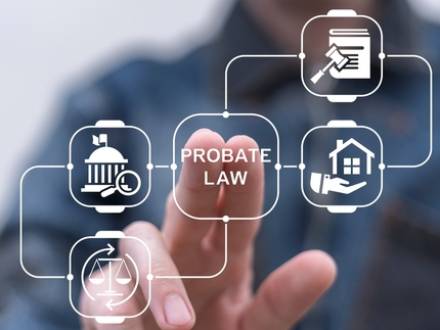Recent Blog Posts
Including Provisions for Your Islamic Funeral and Burial in Your Estate Plan
 Planning for your Islamic funeral and burial is essential for Muslims living in a society with diverse burial traditions. As part of a comprehensive estate plan, these provisions ensure your final rites are carried out in accordance with Islamic law, emphasizing humility, dignity, and expediency.
Planning for your Islamic funeral and burial is essential for Muslims living in a society with diverse burial traditions. As part of a comprehensive estate plan, these provisions ensure your final rites are carried out in accordance with Islamic law, emphasizing humility, dignity, and expediency.
In Illinois, you have the legal right to direct your own funeral and burial preferences. This means Muslims in this state can protect their right to an Islamic funeral using Illinois estate law. With the help of an experienced Oakbrook Terrace Islamic estate planning attorney, you can create a legally binding plan that honors your faith and relieves your loved ones of uncertainty during a difficult time.
What Are the Key Components of an Islamic Funeral?
Islamic law outlines funeral and burial practices. Including the following in your estate plan can help ensure your wishes are respected:
What Are Unmarried Fathers’ Rights in Illinois?
 The state of Illinois has a specific set of legal procedures and standards to govern the rights of unmarried fathers. Navigating this system can be complicated, but an experienced Oakbrook Terrace parental responsibilities attorney will ensure you understand the steps you must take to establish yourself as a father and exercise your rights as a parent. Learn more about fathers’ rights under Illinois law and how they apply to your case.
The state of Illinois has a specific set of legal procedures and standards to govern the rights of unmarried fathers. Navigating this system can be complicated, but an experienced Oakbrook Terrace parental responsibilities attorney will ensure you understand the steps you must take to establish yourself as a father and exercise your rights as a parent. Learn more about fathers’ rights under Illinois law and how they apply to your case.
Establishing Paternity as an Unmarried Father in Illinois
Illinois law recognizes a distinction between a married father and an unmarried father. If you are married to the mother of your child when the child is born, the law automatically presumes that you are the child’s legal father, which makes the process of establishing your legal rights much simpler. However, unmarried fathers must take additional steps to exercise their rights.
What Happens if You Die Without a Will in Illinois?
 In Illinois, dying without a will means that you die "intestate," and your assets are distributed per state law rather than according to your wishes. A well-crafted estate plan allows you to decide everything from who will inherit your property to how you would like to be buried. You can even include elements, such as powers of attorney, that will protect you during your lifetime. An experienced DuPage County estate planning lawyer can help you determine what documents to choose for your plan, including a will.
In Illinois, dying without a will means that you die "intestate," and your assets are distributed per state law rather than according to your wishes. A well-crafted estate plan allows you to decide everything from who will inherit your property to how you would like to be buried. You can even include elements, such as powers of attorney, that will protect you during your lifetime. An experienced DuPage County estate planning lawyer can help you determine what documents to choose for your plan, including a will.
What Are the Illinois Intestate Succession Laws?
According to Illinois statute 755 ILCS 5/2-1, your closest surviving relatives will inherit your assets if you pass away without a will. Without surviving relatives, everything will go to the state, including bank accounts, real property, securities, and many other possessions. In theory, this may sound acceptable to many, but in practice, someone you love and count as a relative may not qualify under Illinois law and could be bypassed by the court. Creating an estate plan is the best way to prevent that from happening.
Custody Disputes Over International Travel: What You Should Know
 Traveling outside the country is typically exciting, especially for a child, but sometimes a parent has reasonable concerns about one parent leaving the country with a child, the most concerning of which is the fear of international child abduction. If you are worried about your co-parent leaving the country with your child, a DuPage County, IL child custody attorney can help you navigate the legal options available to you and ensure you understand your rights in this situation.
Traveling outside the country is typically exciting, especially for a child, but sometimes a parent has reasonable concerns about one parent leaving the country with a child, the most concerning of which is the fear of international child abduction. If you are worried about your co-parent leaving the country with your child, a DuPage County, IL child custody attorney can help you navigate the legal options available to you and ensure you understand your rights in this situation.
Common Reasons a Parent May Contest International Travel Plans
Having genuine concerns about your child’s safety when they are travelling internationally is common. While the conditions for travel are often laid out in the parenting plan, parents often still dispute international travel when it comes up. Some common reasons include:
Understanding the Probate Process in Illinois
 Probate is often a necessary part of executing a will after death. The purpose of probate is to ensure that property is validly distributed according to the will and that all debts are paid. For families grieving the loss of a loved one, probate can be overwhelming and time-consuming. An experienced Oakbrook Terrace, IL probate attorney can provide compassion and understanding in estate management for surviving family members.
Probate is often a necessary part of executing a will after death. The purpose of probate is to ensure that property is validly distributed according to the will and that all debts are paid. For families grieving the loss of a loved one, probate can be overwhelming and time-consuming. An experienced Oakbrook Terrace, IL probate attorney can provide compassion and understanding in estate management for surviving family members.
Is Probate Required for Smaller Estates in Illinois?
The formal probate process is not necessary for estates that contain no real estate and are valued under $100,000. For these smaller estates, the property distribution process simply requires the heirs to use a sworn statement, or simple affidavit, to claim their inheritance. The affidavit is typically only a few pages, but certain agencies may have their own version. In general, the form is used for an heir to request an asset and provide basic information about the person who died, including that no probate proceeding is planned, and the funeral costs are paid.
What Is the Role of an Executor for a Shari'ah-Compliant Will?
 The executor of an Islamic will, known as a "wasi," is responsible for overseeing the distribution of your assets, ensuring your obligations are fulfilled in accordance with Shari’ah law after your death. Ultimately, they protect the interests of your beneficiaries and fulfill state-mandated requirements without compromising Islamic inheritance principles. Therefore, choosing an executor is a vital part of Islamic estate planning, and a DuPage County, IL Muslim will and trust attorney can explain the wasi’s responsibilities and the characteristics that qualify a person to be a good wasi.
The executor of an Islamic will, known as a "wasi," is responsible for overseeing the distribution of your assets, ensuring your obligations are fulfilled in accordance with Shari’ah law after your death. Ultimately, they protect the interests of your beneficiaries and fulfill state-mandated requirements without compromising Islamic inheritance principles. Therefore, choosing an executor is a vital part of Islamic estate planning, and a DuPage County, IL Muslim will and trust attorney can explain the wasi’s responsibilities and the characteristics that qualify a person to be a good wasi.
What Are the Responsibilities of an Islamic Executor?
An Islamic will executor has all the standard responsibilities associated with administering a will. Some examples of their obligations include:
-
Ensuring the proper management and protection of assets included in the estate until the time comes to distribute them
What Is a Standby Special Needs Trust for Muslims?
 Parents of children who have disabilities may feel equally blessed and challenged. Of course, there is a wide spectrum regarding the term "disability." While some disabilities will bring challenges, the child will grow up to lead what is generally considered a "normal" life in that they can seek educational opportunities and work to make a living.
Parents of children who have disabilities may feel equally blessed and challenged. Of course, there is a wide spectrum regarding the term "disability." While some disabilities will bring challenges, the child will grow up to lead what is generally considered a "normal" life in that they can seek educational opportunities and work to make a living.
Other disabilities can hinder educational and employment opportunities. In some cases, it can be difficult to know for certain what the future of a child with disabilities looks like. Situations that seem extremely precarious can change over time. In other cases, disabilities can occur once a child is an adult, resulting in family conflict.
This can lead to dilemmas for Muslim parents who want to help their adult child through estate planning methods without violating Islamic inheritance rules. If you are struggling with a similar issue, it can be extremely beneficial to speak to an experienced Oakbrook Terrace, IL lawyer with significant experience in Islamic law.
What Is Involved in the Discovery Process During Divorce?
 There are many different aspects of a divorce, including the division of marital assets, the determination and award of spousal support, and issues regarding child custody, now known as the allocation of parental responsibilities and parenting time in Illinois. The purpose of divorce is to end the marriage while dividing marital assets and debts in a manner that is considered fair under the equitable distribution laws of Illinois.
There are many different aspects of a divorce, including the division of marital assets, the determination and award of spousal support, and issues regarding child custody, now known as the allocation of parental responsibilities and parenting time in Illinois. The purpose of divorce is to end the marriage while dividing marital assets and debts in a manner that is considered fair under the equitable distribution laws of Illinois.
To accomplish the division of marital debts and assets, there must be a discovery process. In a criminal trial, discovery means each side must reveal the information they have regarding the case. In a divorce, discovery is the process of disclosing financial information, business records, real estate documents, tax returns, and any other information that will be used to divide the marital assets.
Does Islamic Law Permit the Use of Living Wills?
 A living will may also be called an advance directive and is an important part of an estate plan. Your living will tells health care professionals whether you want heroic measures used to keep you alive when you have a terminal illness and cannot state your wishes. Unlike a healthcare power of attorney, an advance directive only applies if you have a terminal condition – any incurable or irreversible condition that means any death-delaying procedures will only prolong the dying process.
A living will may also be called an advance directive and is an important part of an estate plan. Your living will tells health care professionals whether you want heroic measures used to keep you alive when you have a terminal illness and cannot state your wishes. Unlike a healthcare power of attorney, an advance directive only applies if you have a terminal condition – any incurable or irreversible condition that means any death-delaying procedures will only prolong the dying process.
Even if you have a living will or advance directive, food and water cannot be withheld if that would be the only cause of death. If you are pregnant and the health care professional believes you could have a live birth, the living will may not go into effect. Islamic law permits the use of living wills as described more fully below. If you are considering an estate plan, including a living will, having an Oakbrook Terrace, IL estate planning attorney from Farooqi & Husain Law Office can make a difference.
Can I Empty Our Bank Account Before I File for Divorce?
 Although there can be valid reasons for emptying your bank account before you file for divorce – or even taking "your half" of the money in a joint marital bank account – it may not be a good look when you are standing before a judge defending the action. However, there may be exceptions.
Although there can be valid reasons for emptying your bank account before you file for divorce – or even taking "your half" of the money in a joint marital bank account – it may not be a good look when you are standing before a judge defending the action. However, there may be exceptions.
If you feel there is an immediate threat to your safety or that of your children, access to funds could be necessary. If you are worried that your spouse will deny you access to marital funds, then taking your half might be explainable. If you believe your spouse is hiding assets and you think it will take a forensic accountant to find those assets, taking bank funds could make sense.
Finally, if you believe your spouse will deprive you of all funds as a means of preventing you from paying a divorce attorney and filing for divorce, this could also be a valid reason to take your half before you file. A judge would not look kindly on a spouse who refused marital funds to pay attorney fees for a divorce.


 630-909-9114
630-909-9114




